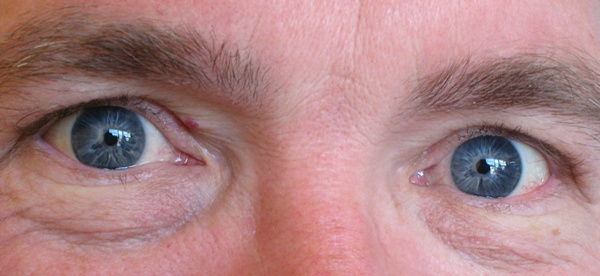The eyes have it

I guess I’m glad that my good friend Doug Hackney had corrective surgery to his eyes. Doug’s always been a visionary, and we wouldn’t want to lose that.
But describing the procedure at length — and including photos of every gruesome up-close eye-scraping and incision, as you can read here if you’re of strong stomach — brought to mind what we in comics fandom call “injury to eye motif.” Here are some sterling examples:


These comics are highly collectible, and I think we can see why: They prey on one of our deepest fears. And although Doug sadly knows little or nothing about comic books, I think he understands the collective subconscious as well as anyone. Why else tease us with a close-up of his visage looking like something straight out of “X, the Man with X-Ray Eyes?” And who could possibly read his story and look at the photos without flinching? No one. Because seeing is believing.
November 9th, 2007 at 7:14 pm
And as we all know, such stuff rots young minds. That’s ironic to me because I thrived on Mad Magazine, monster movies (and Famous Monsters of Filmland magazine), comic books (inclulding the infamous EC titles), trading cards (especially Mars Attacks), TV shows like Soupy Sales and Twilight Zone, science fiction paperbacks, and any other oddball pop culture I could consume. And today my mind is hardly rotted at all.
It’s sad that there are still rabid crusaders out there trying to censor or eliminate the contemporary equivalents of that stuff I loved. Let the kids watch The Simpsons. It’s good for them and provides a handy transitional tool for advancing to more adult fare.
Currently I’m reading “The Meaning of Everything”, a history of the making of the Oxford English Dictionary, along with my She-Hulk and Futurama comic books. I’ve been watching movies like Federico Fellini’s “Juliet of the Spirits” and Martin Scorsese’s “The Age of Innocence”, as well as the remake of “Dawn of the Dead” and the un-remakable “Evil Brain from Outer Space”. There’s room for all of them. We, including kids, should celebrate diversity in the arts.
November 9th, 2007 at 11:31 pm
I read “The Meaning of Everything” — well, I LISTENED to it on CD during some business trip — and it was scintillating. (And it took about 56 years to get to that word in the dictionary….)
Re everything else… hm. I think the post was about fear of injury to the eyes; now you’ve turned it into yet another rant about how crummy comics are good for you. What is one to make of that?
November 11th, 2007 at 11:45 am
Those comic book covers are fantastic.
And I agree about the motif, although I wasn’t consciously trying to leverage it. It’s hard to imagine a more gruesome potential injury. I think that’s why the cage of rats over the face was the ultimate threat. It’s not the face bites, it’s the thought of them eating your eyes.
And while we’re on the topic, the carnivores in Africa always eat the eyes first. We witnessed it at a lion kill of a baby elephant and a wild dog kill of an antelope. So, there may be an evolutionary, hard-wired fear built into us from millennia spent watching animals eat out the eyes of our friends and family.
Lion kill photo (fairly grusome, not for small children): http://www.hackneys.com/photos/02-image108-600.jpg
November 15th, 2007 at 6:03 am
Whether Roesberg’s mind is “hardly rotted at all” is open to some question. Actually the major impact of the EC comics, horror movies and FAMOUS MONSTERS OF FILMLAND was….
…well, if you read/watch these things, the first thing you notice is that the monsters are invariably much more interesting and sympathetic than the nominal heroes, who all sem to wear conservative suits, work steady jobs and vote Republican.
These films were re-released en bloc to second-run movie houses in the early 50s, then sold to television, just at the same time the horror comics flowered. the kids (now known as “Baby Boomers”?”) watched/read them, and understandably identified with the hairy outcasts in dirty clothes, even as they subconsciously rejected the dull “heroes.”
And that’s how Hippies came to be.